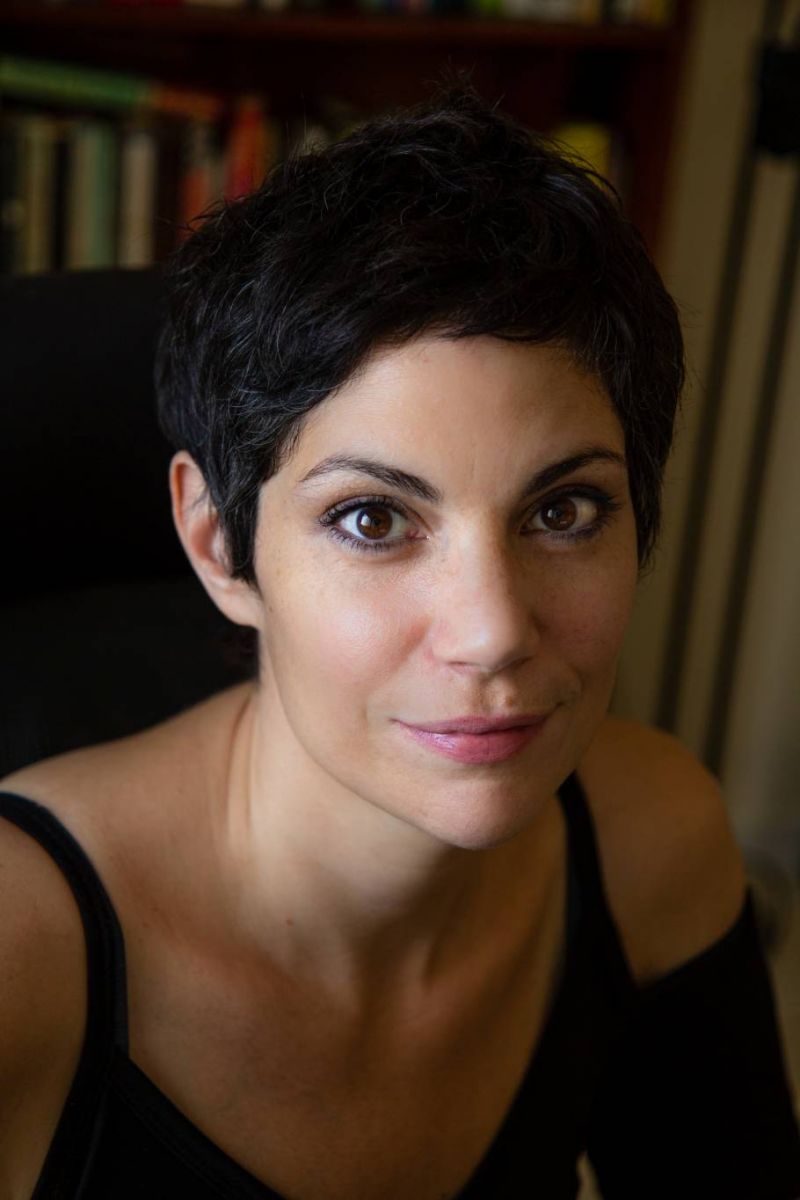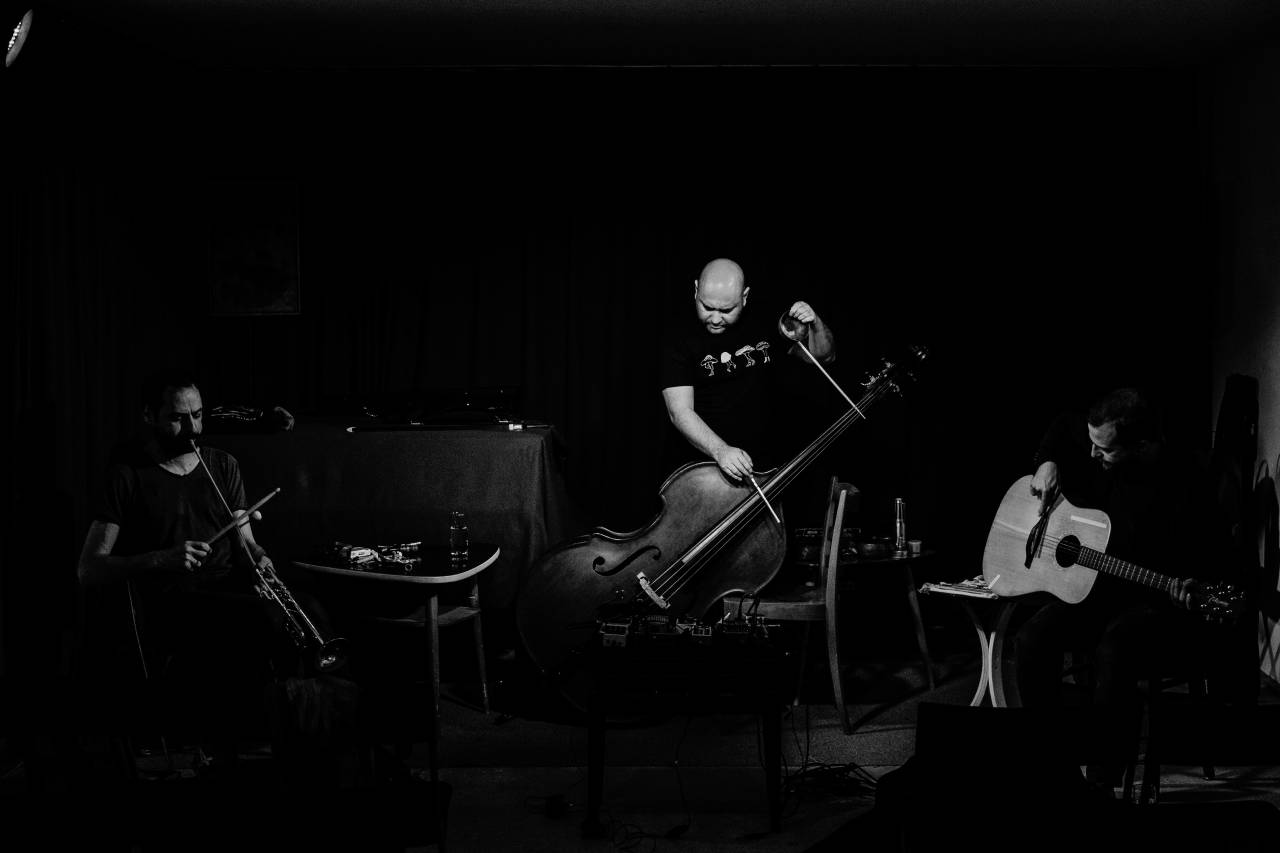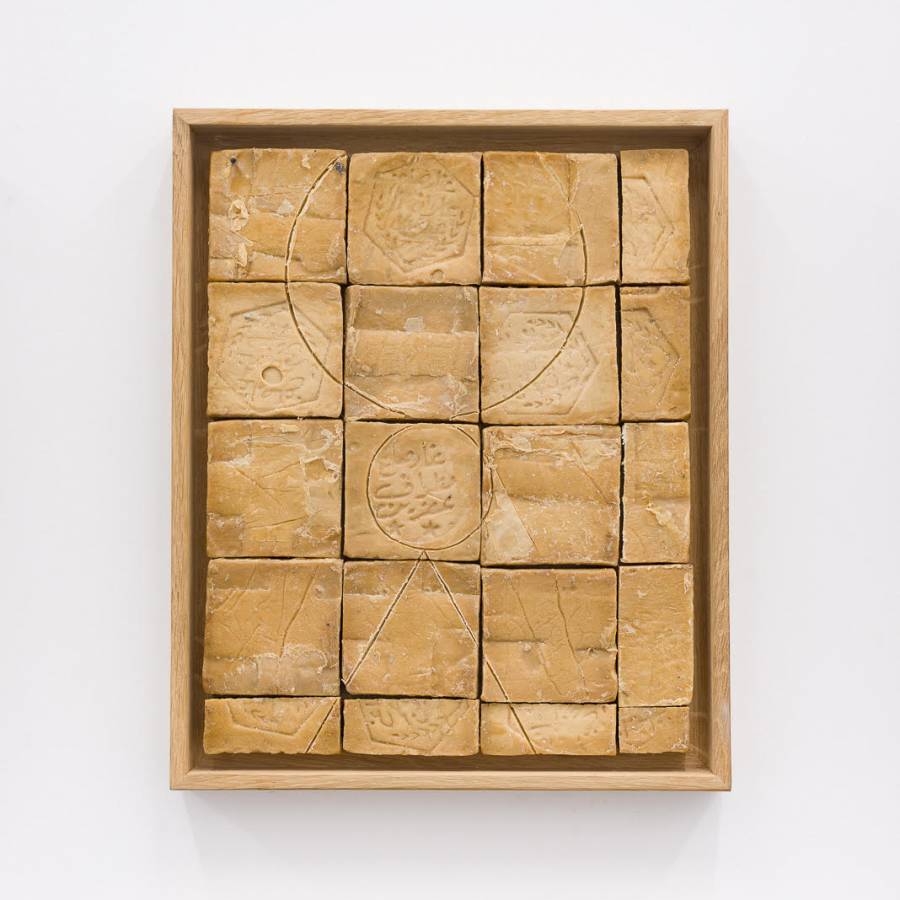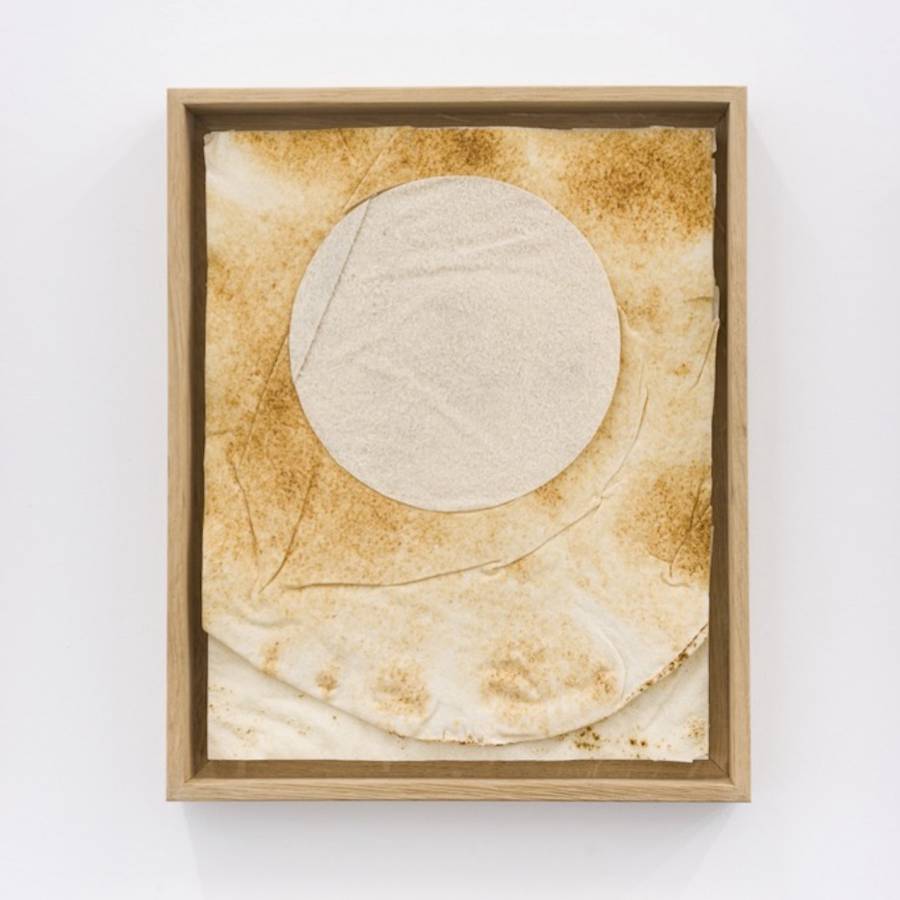
Lina Mounzer. (Credit: ©Fadi Baki)
Note: This story includes excerpts of a long interview with Lebanese writer Lina Mounzer, which took place some weeks before the intelligence branch of the Internal Security Forces summoned her for questioning on Tuesday, June 21.
BEIRUT — “Leaving is important because it recharges you,” says Lina Mounzer. “You have to be so engaged to live here. When things get really bad, it overstimulates. It goes from something that might feel productive and exciting to something very disruptive.”
She smiles as her coffee arrives. After being away for the better part of a year, Mounzer has been preoccupied by the social demands awaiting every Lebanese returning from an extended absence. As the waiter retreats, she glances down into the usually raucous Hamra Street restaurant. It’s still sedate enough to chat about her work.
Mounzer’s writing has appeared in several A-list English-language publications — including The New York Times, The Paris Review and 1843, the culture magazine of The Economist. She contributed a monthly column to L’Orient Today in 2021 and her essay “The Gamble” was selected for the forthcoming Best American Essays 2022. Her work is rooted in Lebanon, and she recognizes the importance of leaving the place, if you can — something she alights upon in her recent essay “The Janus Faced City.”
“Having left for eight months, I feel like a different person returning. I was a broken mess when I left. I didn’t realize how broken and how much of a mess until I went abroad and I was around other so-called normal people ... It took me a really long time to be okay. Now I feel like I have energy again, to deal with everything.”
There is a patina of tragedy around migration these days. It’s not just the stories of people displaced by their countries’ political, societal or climate turmoil, and of the xenophobic politics that have metastasized in states increasingly likely to turn them away.
Witness Lebanon, where opinion has often been less than welcoming of refugees and where endemic domestic instability has long provoked emigration, inspiring local media to decry the loss of the country’s youth, refined into valuable export commodities by the country’s universities.
Members of the creative community have been a prominent part of Lebanon’s brain drain since before the republic was constituted — not least the Mahjar, a cluster of Arab writers (among them Khalil Gibran, Mikhail Naimy and Ameen Rihani) dedicated to reviving Arabic literature, who began to coalesce around New York’s Pen League in 1915. The current suite of disasters has quickened the pace of leaving — pushed by economic desperation and disgust with the political class and its enablers in the business and financial sectors, drawn by hope and access to foreign passports or visas.
Migration can be a complicated matter for professional artists like Mounzer, whose work may remain embedded in their home turf, even after they’ve left it.
“People love to wax poetic about Beirut. ‘It’s unlike any other city!’” Mounzer grins. “Sure, I feel that way, because I grew up here, because so many people I love are here and so many memories are connected to so many different places.”
She touches the coffee cup. “At the same time, you constantly have to be, like, adjusting to live here — adjusting yourself, your expectations, your outlook, your economic situation. This can be mistaken for meaning.”
She chuckles.
“It can make you feel that you are living a life with purpose, because you constantly have to engage in that. This is really good for lazy people, especially lazy artists. I was like that for the longest time — scrambling to make ends meet, so you feel like you’re on the edge of something. It’s like, ‘I’m living the art life here.’ Sure, but how much are you actually writing?”
Mounzer is one of three Lebanese artists who sat with L’Orient Today to chat about leaving and returning to Lebanon, and how it impacts their work.
It’s not Venice, you know
Improv guitarist Sharif Sehnaoui anchors Beirut’s experimental music scene. In 2000 he and Mazen Kerbaj (an improv trumpet player and visual artist) and Raed Yassin (a visual artist and improv contrabassist) cofounded Irtijal, the International Festival for Experimental Music in Lebanon. After a pandemic layoff, Irtijal’s 22nd edition opened 31 March.
For much of Irtijal’s existence, Kerbaj, Yassin and Sehnaoui were Beirut-based artists. Some years back, Yassin relocated to Berlin. Kerbaj and his family followed in 2015. Sehnaoui, on the other hand, began his career in Paris, relocating to Beirut in 2006. He did migrate after 2019, he told L’Orient Today, but only from Beirut to Beit Mery, a 30-minute drive away. Today he’s sitting in a Badaro bar that’s popular among artists in Beirut.
“Early on it was obvious to me that I found more energy here, more anxiety.” His second double espresso clatters back into its saucer. “Doing a good show in Lebanon mattered to me more than doing a good show in New York, or Berlin, or Tokyo or wherever.”
“Maybe that’s because I like to be affiliated to a scene.” He pauses. “I’m very happy to play anywhere, of course, but even when I was based in Paris, my concern was the Paris scene — what constitutes the scene, the different players, the energies, how to connect, how to work together, how to support each other. These were always part of the way I thought of myself, and one of the reasons I created Irtijal.”
 A Trio (Sharif Sehnaoui, right, Raed Yassin, centre, Mazen Kerbaj) performs at Mullbau, Lucerne, in 2016. (Credit: Tony Elieh)
A Trio (Sharif Sehnaoui, right, Raed Yassin, centre, Mazen Kerbaj) performs at Mullbau, Lucerne, in 2016. (Credit: Tony Elieh)
Asked if Beirut has influenced his work, Sehnaoui laughs. “Sure, why not?”
“Everything around you influences the music you do,” he explains. “I don’t try to analyze what has the most influence.”
Though geographically dispersed, Yassin and Kerbaj return for Irtijal, and the trio regularly performs overseas. Sehnaoui was happy to see other Irtijal stalwarts come back for the festival’s 2022 edition, after being forced to migrate in 2020.
“There is something strange about Beirut,” he reflects. “It’s not like Venice, you know. It’s not a beautiful town. It’s chaotic. It’s a bit dirty. The architecture is horrible. But people get quickly fascinated and energized by it.”
He peers into the coffee cup. “The country has almost nothing, but the vibe is still here ... The collapse, the horrible economic situation, the disgusting, empty political discourse heading into elections — it’s really laughable. It drains me, for real, but what I really love is never affected. Everything that’s collapsing was never what I valued in Lebanon.”
Beirut’s pervasive vibe gives Sehnaoui confidence that the scene will continue, regardless.
“One night in April during Irtijal, I’m looking around and I don’t know anybody. Most look like they’re in the 18-28 range, a whole new generation of people, hungry for art, for music,” he says.
“Some of the musicians of my generation are still here. Many are gone, but in an ideal scenario, there is no reason why I should be here forever. There are enough substitutes.”
He laughs. “There’s a deep bench.”
Resilience is our greatest weakness
Pascal Hachem is a prize-winning visual artist whose work — sculptural installations in gallery settings and performances in public spaces — has been shown in solo and group exhibitions worldwide. An engineer by training, Hachem’s work relocates mundane objects to unusual locations, sometimes mechanizing them, to accentuate their poetic resonance.
Hachem is an alumnus of the Nafas initiative. Nafas (Breath) was an emergency program, arranged by the French Institute in Lebanon (IF) and 50-odd partner associations, offering three-month residencies around France for 100 Lebanese artists and cultural professionals.
Nafas’ objective has been simply to offer members of Lebanon’s creative community a chance to take a break from Lebanon’s crises and dedicate themselves to their work, but a number of Nafas beneficiaries were uncertain if they’d be able to, or wanted to, remain in the country over the long term.
 ‘The Lightness of Hell (7),’ 2021. From Pascal Hachem’s series reproducing paintings from Etel Adnan’s series ‘The Weight of the World,’ here using artisanal soap. (Credit: Selma Feriani Gallery)
‘The Lightness of Hell (7),’ 2021. From Pascal Hachem’s series reproducing paintings from Etel Adnan’s series ‘The Weight of the World,’ here using artisanal soap. (Credit: Selma Feriani Gallery)
Before taking up his residency at Paris’ La Cité Internationale des arts, the artist confessed his love-hate relationship with Lebanon.
“We are known for resilience,” he observed in an August 2021 interview. “For me, this is our greatest weakness. When we keep adapting … we are not making change. We’re just finding solutions.”
Upon his return to Beirut this past January, Hachem told L’Orient Today Nafas hadn’t changed his views on the upside and downside of working in Lebanon.
“Beirut takes a lot from you,” he says. “You lose time on stupid things that exhaust you. Your creativity is used to find solutions, to adapt.”
“Beirut is essential,” Hachem says. “But I don’t think it’s the same Beirut. We used to make all our contacts here. Nowadays, [international arts professionals] aren’t coming like before. You have to meet people differently. We’re left with few events. All the art institutions — Beirut Art Center, Ashkal Alwan — are trying to adapt.”
Beirut, however, remains a good place to make art.
“What this tiny city gives you is very different from what a big city offers,” he muses into his glass of ginger tea. Beirut’s social and political dysfunctions, he says, “help me say things in my work. These are my weapons.”
Beirut also has a community of local artisans — jewelry craftsmen, blacksmiths, machinists and the like — whose skills are crucial in fabricating some contemporary artists’ work.
“In Beirut, there’s proximity, and people are willing to work after-hours or on short deadlines,” he says. “It’s a flexibility you cannot find in big cities. It’s much cheaper to do this here … [Although] electricity cuts add a new layer of complexity.”
 ‘The Lightness of Hell (3),’ 2021. From Pascal Hachem’s series reproducing paintings from Etel Adnan’s series ‘The Weight of the World,’ here using artisanal bread. (Credit: Selma Feriani Gallery)
‘The Lightness of Hell (3),’ 2021. From Pascal Hachem’s series reproducing paintings from Etel Adnan’s series ‘The Weight of the World,’ here using artisanal bread. (Credit: Selma Feriani Gallery)
One of Hachem’s fabricators, a machinist, can only operate his lathe when electricity allows.
“He will try to come early in the morning, chasing the electricity,” he says. “Sometimes he goes in at 4 a.m. because he wants to work. You won’t find this everywhere.”
Don’t we suffer beautifully?
For much of her eight months away from Lebanon, Mounzer was with her family in Montreal. She describes the PTSD-like symptoms that followed her there after the Beirut port blast and the unique incongruity of mingling with people whose trauma springs solely from COVID lockdown, while the pandemic has highlighted the shortcomings of Canada’s vaunted social welfare system.
“It really felt like everybody is grappling with a changed world, with feeling out of control, and with knowing that they are being exploited, not living the lives they want to be leading,” she says, “but they don’t have the language to express it.
“In Lebanon now we have the language, and we have the experience of having collectively used that language together, in October 2019. In the face of a crumbling world, that feels like a really powerful thing.”
Mounzer is working on a novel, the details of which she is hesitant to divulge.
“Basically the book takes place here, around 2015-16. It’s irreverent and funny, I hope. I mean, there’s bits of it that I find funny.”
Though parts of the novel were written during overseas residencies, Mounzer says she has discovered that in some ways she writes more effectively about Beirut while in the city.
“I thought that being away would make it easier to recall the landscapes of Beirut 2015. In some ways it did, but it also made it harder,” she says. “I suddenly lost the ability to be funny about Beirut. Because I was abroad, it sounds so much more serious. When I’m here, even in the midst of the horror, the absurdity is so clear. So is that day-to-day texture of what life is here. I’m always trying to get at that — how normal things are here, up-close, not dysfunctional and abnormal. I think that normalcy feels harder to access when I’m abroad.”
She pauses. “In a lot of diaspora work I find there’s a self-seriousness, not about the art itself necessarily but about wanting to speak of this place’s tortured past.”
Mounzer’s perspective on the here and there is formed in part by her writing in English — not Arabic, not French, the language of thinkers whose writings have been foundational to Lebanon’s contemporary art discourse.
Writers from small countries must think internationally, Mounzer says. The cruel fact is that if you write for a local audience alone, you’ll never be able to sustain yourself.
“This gives you a very particular consciousness,” she reflects, “the fact that you are making work about Lebanon for people who don’t know Lebanon. I’ve always found this tension in my work … You need Lebanon to produce work, and you need the outside to consume the work that you’ve produced about Lebanon.”
It can be perilous, Mounzer says, telling Lebanon’s stories to a foreign audience.
“It’s so easy to feed into this very simplistic narrative of what Lebanon is, and what people are living, to fall into that whole Olympics of suffering. ‘My work is worthy because it’s about suffering and we are worthy of attention because we suffer.’” She sighs. “Then your work is no longer judged on its artistic merit or craft.”
“Obviously I write about Lebanon and then I chafe when I’m told that’s what I do.” Mounzer glances into her coffee. “You hate to see yourself as yet another kind of commodity in the economy of making art and ideas.
“‘Look how we suffer. Don’t we suffer beautifully? Don’t we suffer at least as much as the worst sufferers?’ I don’t want to be that writer.”
Writing Lebanon up-close, “that’s my way of resisting,” she says. “I don’t have power over much else.”
